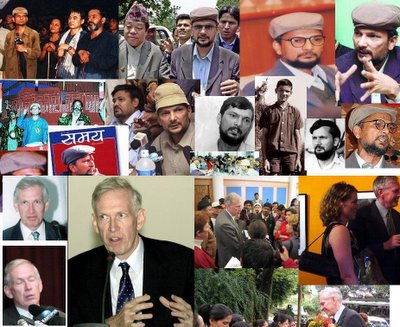
Large quantity of explosives seized from Sunauli areaI kept reading Baburam Bhattarai has written a rebuttal to Moriarty. I searched on Google. I searched at the website of The Kathmandu Post. I called up friends and asked. I put a SOS at Sajha. I should have started at INSN for that is where I found the article.
By A Staff Reporter
KATHMANDU, Feb. 28: The Royal Nepalese Army (RNA) seized a large quantity of explosives two kilometres away from Sunauli near the Nepal-India border Tuesday afternoon, the Defence Ministry said.
Around 2,500 kg of gelatines, 475 Kg of Neogel-90 (Emulsion Explosive Class-2), 7,500 meter of safety fuse, 29,500 sets of detonators along with 10,200 sets of electronic detonators were confiscated by the joint security forces on duty. This is the first time the joint security forces seized explosives in such a huge quantity, the ministry said.
The explosives were intercepted two Km away from the Sunauli check post while going towards Bhairahawa from a Tata truck with Indian plate no: JH 11 A 9822 at 3:30 p.m. The explosives were hidden inside the truck loaded with coal. The Defence Ministry has stated that had the explosives gone undetected then there could have been a colossal damage to life and property.
This is an important debate. But this has not yet become a debate. The two are talking past each other. Specific issues are being bypassed by both individuals.
Baburam Bhattarai is for a constituent assembly. Moriarty is not against that idea. Baburam Bhattarai is for a democratic republic. Moriarty is from a democratic republic.
It is not true Moriarty is against the 12 point agreement. He has problems with only two issues in there. One, that the Maoists may use violence in the movement for a democratic republic. Two, the country will still have two standing armies when it goes through a constituent assembly. I myself have those two concerns. But those are not to be understood as a rejection of the 12 point agreement. Instead, it is like saying, let's keep talking. Let's keep clarifying matters. So instead of accusing Moriarty of rejecting the 12 point agreement, why not engage him on a debate on these two topics?
If the Maoists truly are for a democratic republic, they should be glad Moriarty and the other foreign powers have come forth to spell support for the idea of a constituent assembly. But that also means the mechanics of that assembly are open to debate now. I propose we dismantle both the armies and then go for a constituent assembly. What do you say to that, Dr. Bhattarai?
5 Point Agreement
10 Point Agreement To Succeed 12 Point Agreement
India, Europe, US For A Constituent Assembly
Moriarty Deserves Your Ears
Lohani Baburam Debate
I would like to commend Dr. Bhattarai for an exceptionally well written article. His command of the English language comes across as better than that of Moriarty himself. That is really saying something. Ever since the 12 point agreement, I have not heard Dr. Bhattarai himself say anything that would make me doubt his commitment to the idea of a democratic republic, although I have disagreed with his proposition that violence is the only way to victory. But Prachanda is a slightly different story.
Dr. Bhattarai, what does your party supremo Prachanda mean by this?